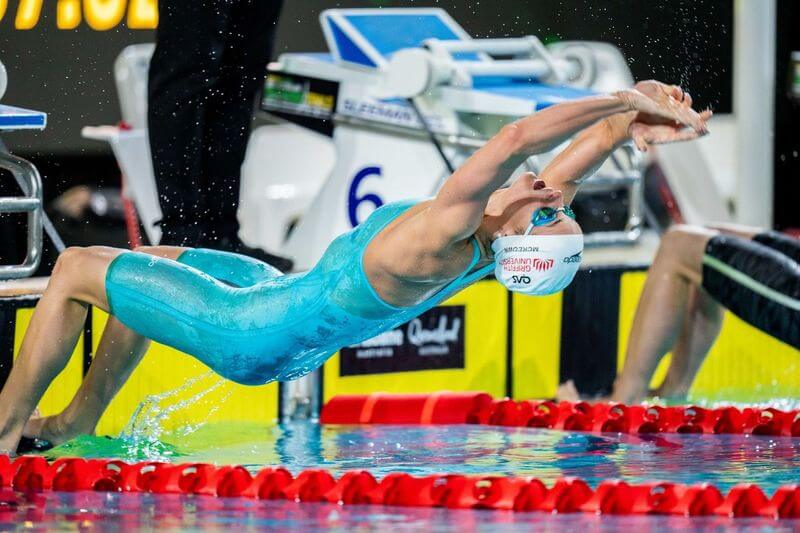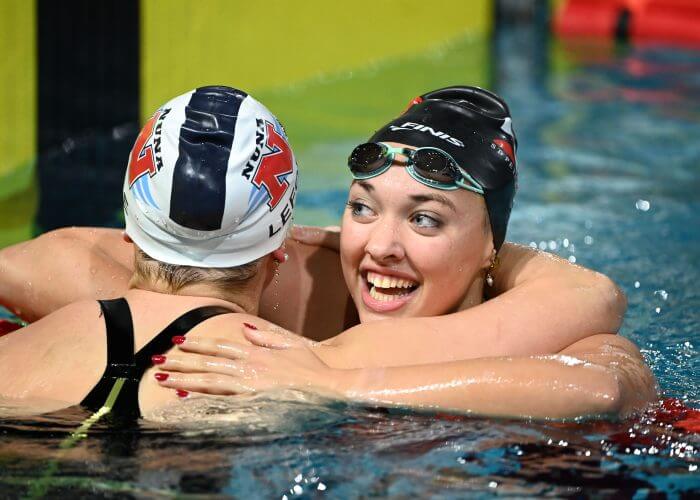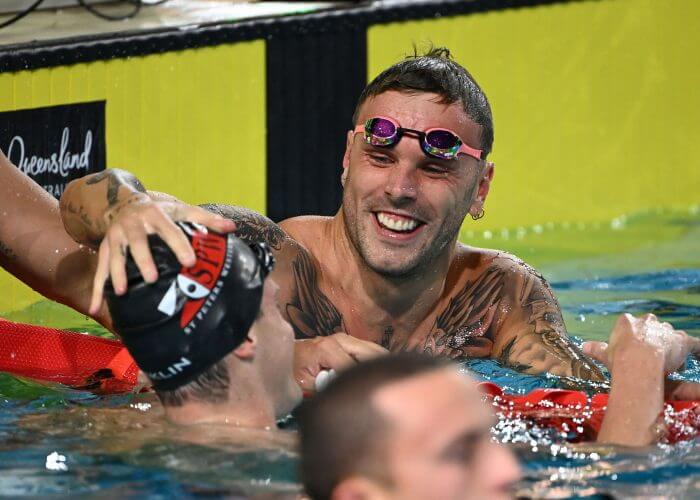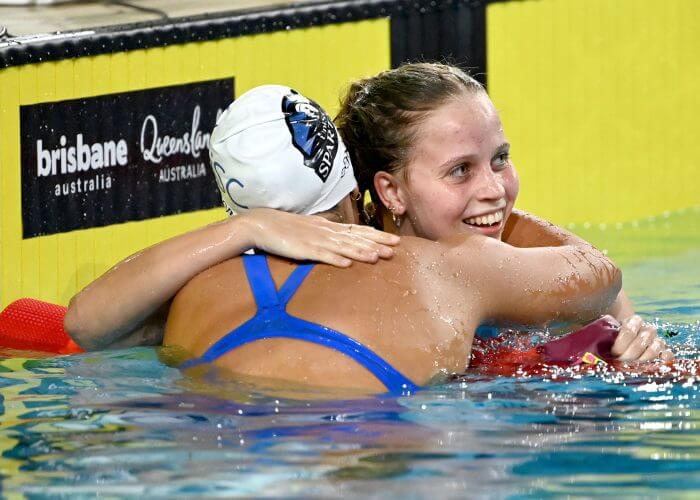Australian Trials, Night 4 Finals: Kaylee McKeown Nudges 200 Back WR; Kyle Chalmers Wins 100 Free; Olympic Redemption For Lizzy Dekkers

Australian Trials, Night 4 Finals: Kaylee McKeown Nudges 200 Back WR; Kyle Chalmers Wins 100 Free; Olympic Redemption For Lizzy Dekkers
The world’s premier women’s backstroker Kaylee McKeown has tonight given her own world record a huge nudge swimming the second fastest time in history – just 0.16 outside her own world mark, in a fighting 200m backstroke final in Brisbane.

SMILE SAYS IT ALL: Jaclyn Barclay qualifies for Paris in the 200m backstroke. Photo Courtesy Delly Carr (Swimming Australia)
The 22-year-old from Michael Bohl’s Griffith University super squad on the Gold Coast clocked a time of 2:03.30 – the fifth time she has swum under 2:04.00 – as she qualified to swim her third event in Paris.
Adding the 200m backstroke to the 100m backstroke and the 200IM for the first time, after chasing the world records in both events, saying: “Maybe I’ll just have to wait until I get to the big stage in Paris…I’m just happy to punch my ticket to the Games.”
But the fastest backstroker in history wasn’t going to die wondering in the opening race of night four at the Brisbane Aquatic Centre.
McKeown was on world record pace from the outset – turning at the 50m mark in 29.08 (0.26 under her own WR split), holding on through the 100m, splitting 1:00.58 (0.15 under) before touching in 1:32.05 at the 150m mark (dropping to be 0.21 outside world time), and missing her own WR by 0.16.
And she will have a 17-year-old in Olympic debutante Jaclyn Barclay – alongside her – another young star from the Dean Boxall stable at St Peters Western.
The World Championship silver medallist from Doha swimming under the QT in 2:07.88 – her teammate Hannah Fredericks third, also under the time in 2:09.22 another show of the depth in Australian women’s backstroke, while the race ended the extraordinary bid by celebrated four-time Olympian Emily Seebohm (St Margarets, QLD) to make it to a fifth Games just nine months after giving birth to son Samson – Seebohm finishing a creditable fifth in 2:10.80 – at 32 years of age.
Meanwhile 2016 Olympic champion and 2020 silver medallist Kyle Chalmers (St Andrews, QLD) qualified for his third Olympics – winning his pet evet the 100m freestyle in 47.75 (22.81) from Will Yang (SOSC, NSW) in 48.08 and Flynn Southam (Bond, QLD) 48.11, Jack Cartwright (St Peters Western, QLD) 48.40, Kai Taylor (St Peters Western, QLD) 48.57 with Zac Incerti (USC Spartans, QLD) rounding out the top six in 48.73 – all strong contenders for Australia’s 4x100m freestyle relay.
Chalmers reflected in his move to the Sunshine Coast with one of his best mates, Ashley Delaney as head coach of the St Andrews College program.
“We established that coach-athlete relationship very early but having Ashley who has been on the Olympic team before and has had success on the Australian swimming team, in my corner and mentoring me is something that I absolutely love,” said Chalmers.
“It’s been amazing being up there (on the Sunshine Coast) and I’ve felt very well supported the whole way through.”
Talking on the Australian relays, Chalmers said: “Relays are always No 1 for me….it’s on the first day in Paris. Last year we were world champions in the 4×100 free and we have some amazing young guys coming through and the senior talent too.
“It’s amazing to see Jack Cartwright qualify in the relay for his first Olympic Games. Jack is someone who I have been through all my junior swimming with….we are the same age at the pinnacle of our sport together it’s very very exciting…”
The world record-breaking star of night three, Ariarne Titmus (St Peters Western, QLD) backed up after her show-stopping 200m swim from Night three to win the 800 metres – adding her third event for the Games – clocking 8:14.06 (57.49; 1:58.41; 3:00.13; 4:02.56; 5:05.19; 6:08.45; 7:12.25) and was under world record pace for the first 300m.
Lani Pallister (Griffith University, QLD) also added the 800m to the 400m for the Paris Olympics, finishing second to Titmus in 8:18.46 – emulating her mother Janelle Elford (and assistant coach to Bohl) who finialled in both the 400 and 800m at the Seoul Games in 1988.

WELCOME TO THE TEAM: Winner Kyle Chalmers congratulates fourth placed Jack Cartwright after the 100m freestyle final. Photo Courtesy Delly Carr (Swimming Australia)
There was redemption for Brisbane butterflyer Lizzy Dekkers (Chandler, QLD) holding her nerve to qualify for first Olympics after missing Tokyo three years ago, saying she had learnt so much about swimming and life, making the cut in 2:06.01.
She will be joined by former Sydney swimmer Abbey Connor (USC Spartans, QLD) who quit the sport 12 months ago before her move to Mick Palfrey’s Sunshine Coast program, turning her career around in a time of 2:06.82 – after her preliminary heat swim of 2:06.43.
The girls following in the footsteps of a host of former 200m flyers, including 1996 Olympic champion Susie O’Neill and triple medallist from 1996, 2000 and 2004 Petria Thomas.
In the men’s 200m individual medley it was the emerging Will Petric (Nunawading, VIC) who was first home in a personal best of 1:57.54 – just a touch off the qualifying time of 1:57.23.
Petric, one of the biggest improvers of 2023-24, will return to the pool on Saturday for a crack at the 400m IM.

FLYERS ON THE WALL: Lizzy Dekkers and Abbey Connor are off to Paris. Photo Courtesy Delly Carr (Swimming Australia)



